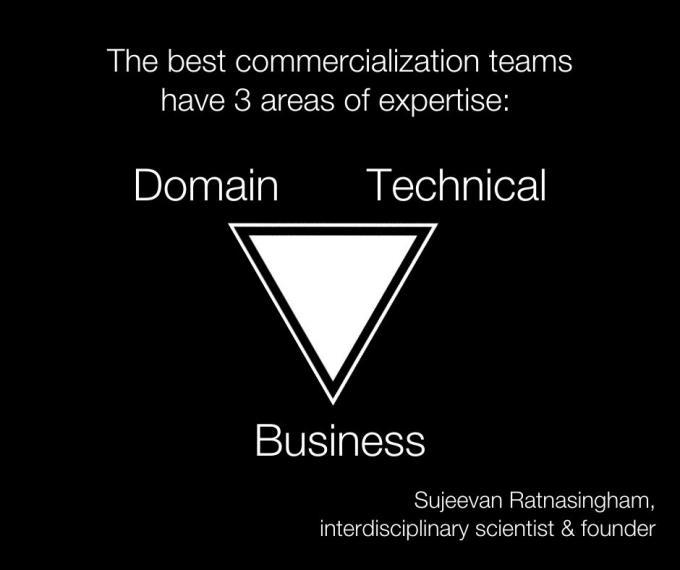Ask Us Anything series: What does the ideal commercialization team look like?

Lots of people have entrepreneurial dreams, but few turn them into reality. So, what do the startup success stories have in common? This was the focus of the first Ask Us Anything session hosted by the Research Innovation Office, a new biweekly session that brings together entrepreneurial-minded people in academia and industry for open conversations about successes, challenges, and best practices when launching a startup company.
“We have such knowledgeable and skilled network and we're so pleased to bring you all together just to share ideas and any successes or pain points. I think this will be a really great group to just sort of bounce ideas off the wall and if you need help, I think it's just such a great opportunity that we have” said New Venture Creation Coordinator Kelly Ziegler in the opening remarks.
Dr Tyler Zemlak, New Venture Creation Manager, then took the virtual floor to discuss the Startup Theory, coined by his colleague Dr Sujeevan Ratnasingham, co-founder & COO of Multiplex Genomics and adjunct professor at the Centre for Biodiversity Genomics within the Department of Integrative Biology. The startup theory posits that the best commercialization teams have three distinct areas of expertise. The first is domain-specific expertise, someone very familiar with the problem space and has deep knowledge of the customer’s needs. Second is the technical expert who can solve problems using out-of-the-box thinking. Finally, a business expert brings the entrepreneurial knowledge and commercialization skills to accelerate the financial success of the team. Attendees were then asked to reflect on their own experiences and share their thoughts on this theory. Here are some high-level takeaways from that conversation:
Joe Dales, CoFounder/President, Agri & Food Innovation RH Accelerator Inc.: “It’s pretty hard to design a product or service that somebody will stroke a check for, so the domain expertise is important. The biggest train wrecks are when someone’s not watching the cash flow, so you do need somebody that knows business implicitly. I’m a technical founder, but I went back for my MBA because I realized that I didn’t know how to do a cash flow or read an income statement or balance sheet, and that’s how the game is scored. The hardest part, and what I’m always looking for in a new company, is the technical knowledge that the IP will come from – the unique software, knowledge, or concept. I like this three-legged model and I’m glad you shared it with me because I hadn't seen it really spelled out like this. But I'm going to borrow it now going forward.”
Dr David Hobson, Technology Transfer and Entrepreneurship Manager, Research Innovation Office: “Too many people rely on the technology selling itself and it doesn't. It's the people that make the difference. It has to be a diversified team because you put a whole bunch of engineers in a company, well, they're always working on the technology and they're not working on the business. You put a whole bunch of marketing people together, they're working on the branding and they're not working on the product. If you're missing one of these of these three pillars, you're making yourself very vulnerable. You could waste your time and you're going to have a really hard time raising capital unless you're independently wealthy. So, you might as well make a good team right from the beginning. Don't wait to put a good team in place after you've invested a couple years in your company.”
Dr Thomas Koch, Biomedical Sciences Department: “I've been trying to do this for a long time and it's not until the last two years that I had a bit of a breakthrough and I think those 3 domains were critical. First, it was me as the scientist that wouldn't meddle and then the seed investor and major investors bought into the whole team that was put together. It was a lot of just getting the word out there that you're there, and then serendipity and certainly people contact you out of the blue that you didn't expect and want to talk to you. My initial pitch, I had a very holistic approach. And we still have a holistic approach, but it was hard to pitch. When we started to pitch more, we focused on just one aspect - we got more traction and then once you had people’s attention, we could go more holistic from there to what other ideas we had, but starting out holistically didn't work well.”
Also in attendance were Erin Young (Business Incubation Services Manager, Gordon S. Lang School of Business and Economics), Jim Millington (CEO of Canada Protein Ingredients), Dr Nicole Weidner (recent graduate, Biomedical Sciences Department), Steve Langford (VP Marketing, Wesley Clover International Corporation), Saskia Brussard (Crave Consulting & Communications), and Dr Max Jones (Department of Plant Agriculture).
Whether you’re an established entrepreneur or early in your startup journey, join us for our next sessions and connect with likeminded peers!
December 1: Social Media Tips for Academic Entrepreneurs with Shannon Clement
December 15: IP Essentials with David Hobson
January 12: Entrepreneur Meetup
January 26: Writing Op Eds with Saskia Brussaard
Questions about this series or topics you would like to suggest? Email Kelly at kziegler@uoguelph.ca